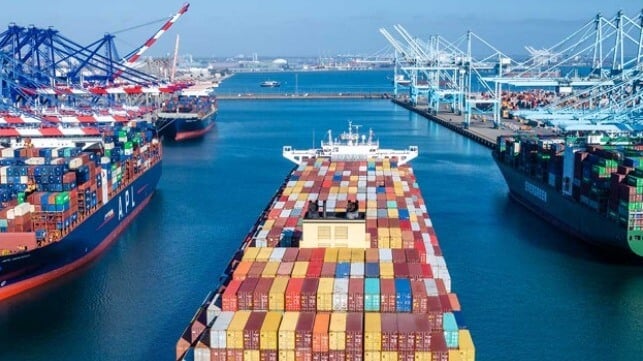Surge in Shipments from China May Be Short-Lived Industry Warns

Following the announcement of the 90-day lower of the tariffs between the United States and China, there were multiple reports that shippers were rushing to move goods. While it led to a forecast of a surge in shipments following the recent drought, many across the industry are now questioning if a true surge is building while also noting it is unsustainable without further agreements.
Speaking on CNBC yesterday, May 14, the Port of Los Angeles’ Executive Director Gene Seroka pointed to likely “some pent-up demand” as feeding the temporary jump in reported container bookings from China. He notes that there was likely some finished product in warehouses or loaded containers when the 145 percent tariffs began, which has now been released into the system.
Data from container-tracking service provider Vizion highlighted just how quickly shippers move to get those products moving again while taking advantage of a relatively short window provided by the agreement between the United States and China. In the four days from May 9, just before the agreement, to May 13, Vizion’s data showed an 82 percent surge in container bookings from China to the U.S.
Vizion highlighted the surge comparing the China-U.S. bookings to a 29.6 percent week-over-week jump in global TEU volumes for the week of May 5, while noting that it remained down 21 percent year-over-year. U.S. import volumes they reported climbed 40 percent week-over-week in the same period.
The momentum has continued to build. Yesterday, May 14, Ben Tracy, Vizion’s VP of Strategic Business Development, wrote in a LinkedIn posting that a rolling seven-day average for bookings TEU between China and the U.S. was up 277 percent on May 13.
The CEO of Hapag-Lloyd confirmed the same trend speaking to investors on May 14. He said bookings between China and the U.S. had surged by 50 percent or more, while warning it might not last. “We see a surge that could be very short-lived,” said Rolf Habben Jansen, “but it could also last for 60 or 90 days.” He said it would depend on the outcome of the next phase of the trade talks.
A manager at China’s Yantian Port, typically the busiest departure point for U.S.-bound cargo, told the Global Times that shipping companies have been inquiring about adjusting berthing schedules. Ships were being rerouted, Lin Risheng told the Chinese newspaper, saying carriers were working to take advantage of the 90-day tariff suspension.
Speaking on CNBC’s Squawk on the Street program on Wednesday, Seroka, however, noted the 90-day pause is “not a lot of runway in our business.” He said they had a 30 percent drop last week in expected cargo volumes and are projecting a 25 percent drop for the month of May.

that matters most
Get the latest maritime news delivered to your inbox daily.
Carriers have blanked 17 out of 80 scheduled ship calls for May at the Port of Los Angeles. Another 11 of 80 have also been blanked for June. Seroka reports that ports all along the U.S. West Coast are seeing similar impacts from the tariffs.
For the Port of Los Angeles, 45 percent of its business is tied to shipments from China. Last week's drop was second only to March 2020 when the Port of Los Angeles saw a 50 percent drop as the COVID-19 pandemic began.
